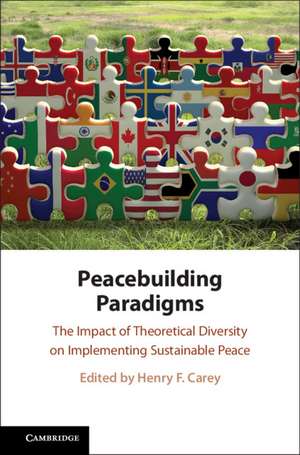Peacebuilding Paradigms: The Impact of Theoretical Diversity on Implementing Sustainable Peace
Editat de Henry F. Careyen Limba Engleză Hardback – 16 dec 2020
| Toate formatele și edițiile | Preț | Express |
|---|---|---|
| Paperback (1) | 292.45 lei 6-8 săpt. | |
| Cambridge University Press – 6 iul 2022 | 292.45 lei 6-8 săpt. | |
| Hardback (1) | 732.54 lei 6-8 săpt. | |
| Cambridge University Press – 16 dec 2020 | 732.54 lei 6-8 săpt. |
Preț: 732.54 lei
Preț vechi: 851.79 lei
-14% Nou
Puncte Express: 1099
Preț estimativ în valută:
140.17€ • 146.35$ • 116.01£
140.17€ • 146.35$ • 116.01£
Carte tipărită la comandă
Livrare economică 05-19 aprilie
Preluare comenzi: 021 569.72.76
Specificații
ISBN-13: 9781108483728
ISBN-10: 1108483720
Pagini: 250
Dimensiuni: 160 x 235 x 20 mm
Greutate: 0.74 kg
Editura: Cambridge University Press
Colecția Cambridge University Press
Locul publicării:New York, United States
ISBN-10: 1108483720
Pagini: 250
Dimensiuni: 160 x 235 x 20 mm
Greutate: 0.74 kg
Editura: Cambridge University Press
Colecția Cambridge University Press
Locul publicării:New York, United States
Cuprins
List of figures; List of tables; Acknowledgments; Foreword George Lopez; Introduction: bridging the conceptual and theoretical divides on peace and peacebuilding Henry F. Carey and Onur Sen; Part I. The Realist Paradigm: 1. Strategies for peace Michael Fowler; 2. Realism, rationalism, and peace: a top-down and a staged perspective Norrin M. Ripsman; 3. Building peace through social relationships: a primatological perspective Sarah F. Brosnan; Part II. The Liberal Paradigm: 4. Liberal peacebuilding: bringing domestic politics back in Louis-Alexandre Berg; 5. Conflict prevention and management I. William Zartman; Part III. The Constructivist Paradigm: 6. The social construction of peacebuilding Brandon Howe; 7. Generations of constructing peace: the constructivism paradigm and peacebuilding Erin McCandless and Timothy Donais; Part IV. The Cosmopolitan Paradigm: 8. A pluralist cosmopolitanism for the 21st century Richard A. Falk; 9. The international law of peace Henry F. Carey and Rebecca Sims; 10. Islamic Gnosticism and peace: a paradigmatic shift in pursuit of peace Farid Mirbagheri; Part V. The Critical Theory Paradigm: 11. Critical approaches to peacebuilding Jacob Mundy; 12. A new paradigm: engendered-sustainable peace and security Úrsula Oswald Spring and Stacey M. Mitchell; 13. From Scylla to Charybdis? The risks and opportunities of digital peacebuilding Oliver P. Richmond and Ioannis Tellidis; Part VI: The Locality Paradigm: 14. Envisioning peace/transforming conflict: a global approach to peace Sabine Kurtenbach; 15. Paradigm partners for locally grounded peacebuilding John Hoven; 16. Cultural peacebuilding Aigul Kulnazarova; Part VII. The Policy Paradigm: 17. Peacebuilding paradigm from the perspective of policy approach: its outline through comparison Chigumi Kawaguchi and Josuke Ikeda; 18. A bottom-up view at peacebuilding: pragmatism, public opinion and the individual as unit of analysis in post-conflict societies Ridvan Peshkopia; 19. Conclusion: a hybrid approach to understanding peacebuilding Henry F. Carey and Stacey M. Mitchell; Bibliography; Index.
Descriere
Peacebuilding is explained by combining interpretive frameworks (paradigms) that have evolved from the subfields of international relations and comparative politics.
